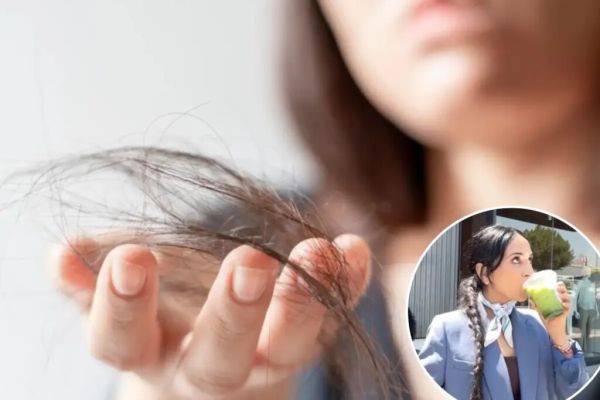
It’s a follicle fiasco.
Women are flooding social media with warnings about one of today’s trendiest drinks, sharing horror stories of sudden hair loss they say began after they started drinking it regularly.
Could the viral “Gen Z green juice,” praised for its health benefits, really be sabotaging your strands? The Post asked two registered dietitians to get to the root of it.
It’s a vibrant green tea made from specially grown leaves that are finely ground into a powder and whisked with hot water.
The result is a frothy, bright beverage that has long been a staple in Japan and in recent years has exploded in popularity across the Western world, with demand so high it’s sparked a global shortage.
The drink has become especially fashionable among wellness influencers, who tout it as a healthier, Instagram-worthy alternative to coffee.
“If you find that you’re losing hair after increasing your intake of matcha, it might not be the tea itself, but the tannins in the tea,” Stephanie Schiff, a registered dietitian nutritionist at Northwell Huntington Hospitaltold The Post.
Tannins are plant-based compounds that boast antioxidant properties.
They can bind to iron, making it harder for your body to absorb the essential nutrient — one it can’t produce on its own and must get from food or supplements.
“This can lead to an iron deficiency, and that can lead to hair loss,” Schiff said.
Caffeine could also be a culprit.
Matcha contains more of the stimulant than most green teas, with a typical serving of 1 to 2 grams packing up to 80 milligrams.
“Very large caffeine intakes can raise stress hormones, which, in some people, can trigger temporary shedding,” Amy Shapiroa registered dietitian and nutritionist, told The Post.
“There is no specific or proven level that increases risk; however, one to two servings per day is unlikely to cause hair loss for the average person,” said Shapiro, the founder and director of Real Nutrition.
She noted that those most at risk are people who already have low iron or anemia, including those with heavy menstrual losses, certain gastrointestinal conditions or strict vegans with low iron intake.
People who consume very large amounts of matcha daily — or take concentrated green-tea extract supplements — are also more likely to experience hair loss, Shapiro added.
“If someone is concerned about hair loss, check your iron labs rather than guessing,” she advised.
“If you think your iron levels may be low, don’t drink matcha before, shortly after or while eating plant sources that contain high iron levels, such as spinach, white beans or tofu,” Schiff said. “If you’re getting iron from animal sources, you should be fine.”
Shapiro recommends pairing plant-based iron foods with vitamin C–rich options, like citrus, bell peppers, strawberries and brussels sprouts.
“Vitamin C markedly improves non-heme iron absorption and can offset tannin effects,” she said.
Unless prescribed, Shapiro added, people should avoid high-dose green-tea extracts or supplements, which carry a higher risk of side effects than the tea alone.
“If someone experiences hair shedding, I recommend screening for other common causes,” such as thyroid problems, stress or medications, Shapiro said. “Matcha is only one possible contributor.”
“Some people find that matcha upsets their stomach and causes nausea or indigestion. This is likely due to the tannins,” Schiff said.
When consumed in excess, Shapiro said, the caffeine in matcha may also cause insomnia, jitteriness, heart palpitations, anxiety or higher blood pressure in sensitive people.
She also reported that in rare cases, heavy green-tea drinking may lead to liver enzyme elevations and liver injury, which is typically caused by high concentrations of the antioxidant EGCG.
The risk is greatest with concentrated green-tea extract supplements, especially when taken on an empty stomach, Shapiro said. Symptoms include jaundice, nausea and abdominal pain, but the damage is usually reversible.
“Matcha is one of the more nutrient-dense ways to consume green tea because you ingest the whole leaf,” Shapiro said.
The drink contains L-theanine, an amino acid that promotes relaxation without causing drowsiness. When combined with matcha’s caffeine, she said, it can improve mental alertness without the jittery crash that might come from other sources, like coffee.
Schiff noted that EGCG helps neutralize free radicals — or unstable molecules that can damage cells and fuel inflammation. This, she said, can lower the risk of certain chronic conditions, such as heart disease.
“Green tea is high in EGCG,” Schiff said. “Matcha, a more concentrated version of green tea, can give us three or more times the amount that green tea has.”
Drinking matcha has also been linked to higher insulin sensitivity, which can help lower blood sugar levels.
“That’s good news for people with pre-diabetes or diabetes,” Shapiro said.
“Some studies even show that drinking matcha can cause weight loss by decreasing your appetite and increasing your metabolism,” she added.